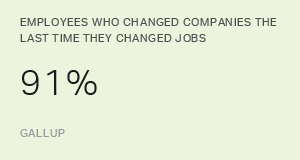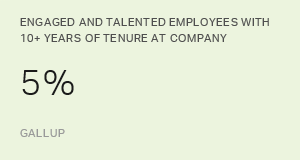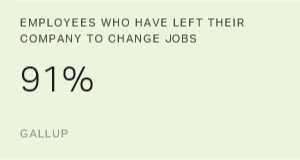Do you know how many of your employees are looking for another job?
According to Gallup's 2017 State of the American Workplace report, 51% of currently employed adults in the U.S. say they are searching for new jobs or watching for new job opportunities. What's more, they are optimistic about their chances: 47% of workers say now is a good time to find a quality job.
It hasn't always been this way. In 2012, only 19% of the American public agreed that it was a good time to find a quality job. In short, employees today believe a better job is out there waiting for them -- and one in two is looking.
Organizations that rely on world-class talent must find more creative ways of re-recruiting their top performers, even when traditional incentives (i.e., pay and promotions) are not immediately available. With 50% of your workforce on the line, here are a few ideas to re-recruit your high performers and avoid turnover.
Help Your Stars Find Another Job With You
In today's work world, it is implicit that "looking for another job" means "looking for another job somewhere else." According to Gallup analytics, 91% of employees say the last time they changed jobs, they changed companies to do so. And employees still leave organizations that they believe in, where they love the pay and perks, and where they have been productive. The reason? Many people leave because of bad managers.
Unfortunately, one sign of a bad manager is an inability to let their best people move and change. Leaders in charge of retaining talent must make sure that employees know they have options to stay within the organization -- even if that means creating new job descriptions -- without having to leave.
Show Your Stars How They Can Grow With You, Not Outgrow You
Growth is not only for the young, outwardly ambitious or competitive -- all human beings have a need to learn and grow. (And this includes late-career baby boomers!) Development conversations do not need to focus on pay or promotions to be meaningful. Growth can mean learning new skills, collaborating with new teams, getting to travel, having greater autonomy or mentoring new employees.
Today's employers must learn to adapt and personalize career paths in ways that make sense for the people on them. Don't assume; ask!
Onboard Your Stars Again
You may think your perks are helping retain employees -- but are workers actually taking advantage of those perks? You may think your employees know what your mission and values are, but do they? If your current employees are not "on board," it may be time to reintroduce your employer value proposition. What promises do you make to your employees? What can they expect to gain from their experiences in your organization?
Recognize Your Stars (Not Everyone)
A lack of recognition remains one of the most common reasons why employees leave an organization. What's more, some Gallup research suggests that the more talented the employee is, the faster they leave, compared with other disengaged employees.
It's true that many organizations have recognition programs now -- however, most do not take into account what's most meaningful for each individual. Getting "points" on a workplace social media platform may not mean as much as having their manager copied on an email explaining what a difference they made.
Any rewards program should be tied to the most important metrics of the organization. Furthermore, recognition should follow genuinely exceptional performance. Your high performers will quickly see through anything less than excellence -- and seeing awards for mediocre work will only signal to your stars that your organization is not for them.
Start the Conversation With Your Stars
The time to have a professional development conversation is before your star employees find another job. This is the heart of re-recruitment -- asking those "interview questions" again with a fresh perspective: What kind of job are you looking for? How do you want to grow in the future? What perks are most important to you? What kind of recognition matters most to you? If you haven't had a future-focused, development conversation with your top performers lately, you need to have one ASAP -- because chances are, they're already looking for their next opportunity somewhere else.
Gallup can help you reduce turnover and retain more of your top performers:
- Download our State of the American Workplace report to gain an in-depth perspective on what employees want most out of a job and company.
- Bring our Leading High-Performance Teams course to your organization and help all managers understand how to deliver growth-oriented performance conversations.
- Inquire about our solutions for creating a compelling employment brand and employee value proposition.



